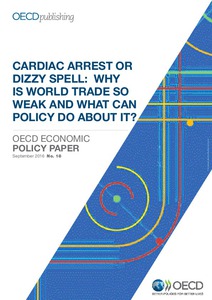Cardiac arrest or dizzy spell: why is world trade so weak and what can policy do about it?
"World trade growth was rapid in the two decades prior to the global financial crisis but has halved subsequently. There are both structural and cyclical reasons for the slowdown. A deceleration in the rate of trade liberalisation post 2000 was initially obscured by the ongoing expansion of glo...
| Main Authors: | , , , , |
|---|---|
| Institution: | ETUI-European Trade Union Institute |
| Format: | TEXT |
| Language: | English |
| Published: |
Paris
2016
OECD |
| Subjects: | |
| Online Access: | https://www.labourline.org/KENTIKA-902812472009-Cardiac-arrest-or-dizzy-spell-.htm |
| _version_ | 1771659894250799104 |
|---|---|
| author | Haugh, David Kopoin, Alexandre Rusticelli, Elena Turner, David Dutu, Richard |
| author_facet | Haugh, David Kopoin, Alexandre Rusticelli, Elena Turner, David Dutu, Richard |
| collection | Library items |
| description | "World trade growth was rapid in the two decades prior to the global financial crisis but has halved subsequently. There are both structural and cyclical reasons for the slowdown. A deceleration in the rate of trade liberalisation post 2000 was initially obscured by the ongoing expansion of global value chains and associated rapid emergence of China in the world economy. Post the financial crisis global value chains started to unwind and, possibly associated with this, Chinese and Asian trade weakened markedly. These structural changes were compounded by insipid demand due to anaemic growth of global investment, as well as intra-euro area trade, both of which are trade intensive. The slowdown in world trade growth post crisis, if sustained, will have serious consequences for the medium-term growth of productivity and living standards. Trade policy has significant potential to reinvigorate trade growth but the political environment for reforms is difficult, with a growing polarisation of OECD electorates into pro- and anti- globalisation supporters. Further trade and investment policy liberalisation should be introduced as part of a wider package of structural reforms to spread the benefits of freer trade and investment more widely." |
| format | TEXT |
| id | 902812472009_11a4d7bf0470402fa6b59e8d769a623a |
| institution | ETUI-European Trade Union Institute |
| is_hierarchy_id | 902812472009_11a4d7bf0470402fa6b59e8d769a623a |
| is_hierarchy_title | Cardiac arrest or dizzy spell: why is world trade so weak and what can policy do about it? |
| language | English |
| physical | 38 p. Digital |
| publishDate | 2016 |
| publisher | Paris OECD |
| spellingShingle | Haugh, David Kopoin, Alexandre Rusticelli, Elena Turner, David Dutu, Richard business cycle globalization trade trade liberalization value chains Cardiac arrest or dizzy spell: why is world trade so weak and what can policy do about it? |
| thumbnail | https://www.labourline.org/Image_prev.jpg?Archive=105634692381 |
| title | Cardiac arrest or dizzy spell: why is world trade so weak and what can policy do about it? |
| topic | business cycle globalization trade trade liberalization value chains |
| url | https://www.labourline.org/KENTIKA-902812472009-Cardiac-arrest-or-dizzy-spell-.htm |

